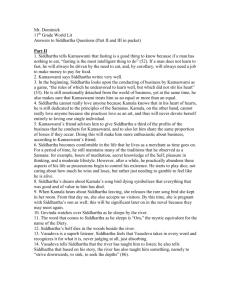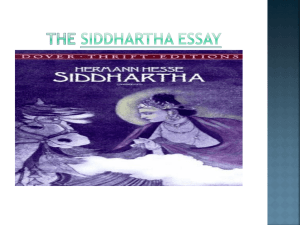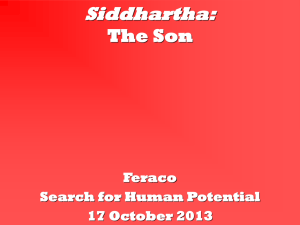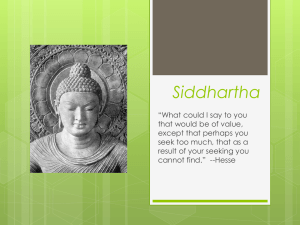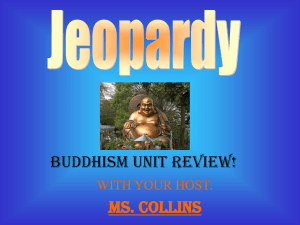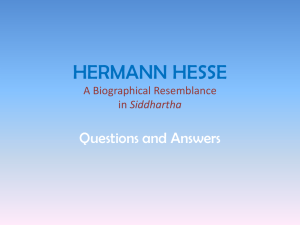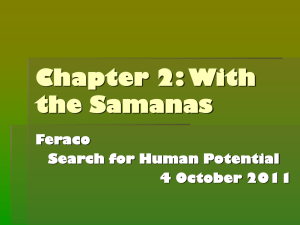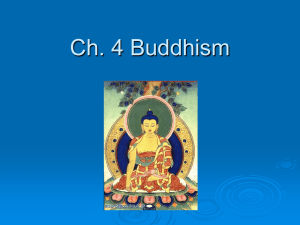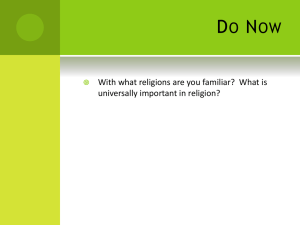Amongst the People
advertisement
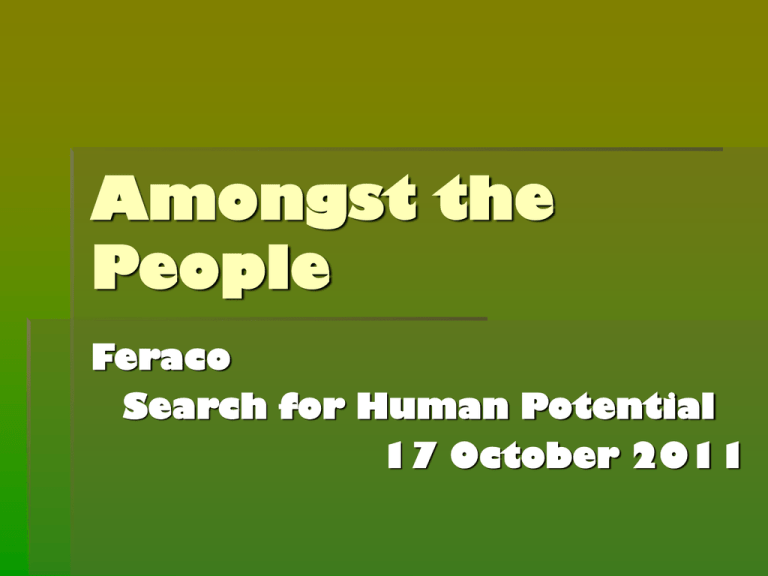
Amongst the People Feraco Search for Human Potential 17 October 2011 Siddhartha “Amongst the People” is ironically named: Siddhartha is among them, but he never allows himself to be part of them (even as he increasingly becomes one of them, he remains steadfastly in denial) It begins with a description of Kamaswami that fits well with what Kamala has said about him: he’s the picture of decaying wealth, graying hair paired with clever eyes Siddhartha He’s confused by Siddhartha’s statement about not being in need; as a creature of desire, Kamaswami literally cannot comprehend such a thing “How will you live if you are without possessions?” This gives Kamaswami and Siddhartha the chance to learn about one another via a dialogue about the giving and taking that’s omnipresent in human life Siddhartha Once again, Kamaswami cannot understand how Siddhartha lives as he does, for he doesn’t believe Siddhartha has anything to offer if he can only use his skills (rather than possessions) in an exchange The language of exchange is really the only language Kamaswami speaks Once Siddhartha convinces him that his skills are useful in an exchange, Kamaswami respects him – particularly once he learns Siddhartha can write Siddhartha Both what Siddhartha writes and that Siddhartha writes prove important His saying – “Writing is good, thinking is better. Cleverness is good, patience is better” – has poignancy when we consider where he ends up, trapped by his own “cleverness” and attention to the bottom line Moreover, the fact that Siddhartha can read, write, and speak is very noteworthy Siddhartha Once we acquire language, we lose the ability to think without words – to come up with thoughts that no words can describe Indeed, our thoughts express themselves in sensory terms Thus our thoughts become part of our reality, and our command of language therefore dictates the depth of the reality we perceive (maya!) Siddhartha Kamala’s reality is therefore incomplete – she cannot read or write, and by lacking language, she lacks connection to the world…she lacks reality The less you understand about the veil, the harder it proves to pierce This is why Siddhartha chooses to study the Self rather than hide from it, and why our bodhisattvas finally reach enlightenment Siddhartha Once Siddhartha is accepted into Kamaswami’s service, he retains some of his old habits; he doesn’t become entirely like the man for another chapter/decade or so “Kamaswami conducted his business with care and often with passion, but Siddhartha regarded it all as a game, the rules of which he endeavored to learn well, but did not stir his heart.” His approach to business frustrates and even infuriates the old merchant, for the younger man’s lackadaisical approach to profit and loss increases the elder man’s risk Siddhartha Siddhartha, on the other hand, seems interested in making human connections – a noble (and, for Kamaswami, novel) sentiment, but one we quickly see isn’t entirely accurate “Siddhartha’s sympathy and curiosity lay only with people, whose work, troubles, pleasures, and follies were more unknown and remote from him than the moon. Although he found it so easy to speak to everyone, to live with everyone, to learn from everyone, he was very conscious of the fact that there was something which separated him from them…” Siddhartha However, he increasingly devotes himself to Kamala, which is in keeping with his single-minded approach to his pursuits He even convinces himself that Kamala understands him better than Govinda did “He spent wonderful hours with the clever, beautiful courtesan and became her pupil, her lover, her friend. Here with Kamala lay the value and meaning of his present life, not in Kamaswami’s business.” Siddhartha In other words, the embodiment of desire understands him better than the searcher His conversation with her about leaves and stars is sad, in a way Even though Hesse only says it outright at the end, the tone of Siddhartha’s dialogue is weary and regretful, the pitch of a man who knows he’s letting his life slip away yet refuses to stop it The seeds of Siddhartha’s fall are sown here …He occupied his thoughts with all this game and the passion with which all men play it, as much as he had previously occupied his thoughts with the gods and Brahman. At times he heard within him a soft, gentle voice, which reminded him quietly, complained quietly, so that he could hardly hear it. Then he suddenly saw clearly that he was leading a strange life, that he was doing many thing that were only a game, that he was quite cheerful and sometimes experienced pleasure, but that real life was flowing past him and did not touch him. Like a player who plays with his ball, he played with his business, with the people around him, watched them, derived amusement from them; but with his heart, with his real nature, he was not there. His real self wandered elsewhere, far away, wandered on and on invisibly and had nothing to do with his life. He was sometimes afraid of these thoughts and wished that he could also share their childish daily affairs with intensity, truly to take part in them, to enjoy and live their lives instead of only being there as an onlooker. Siddhartha There’s a reason he ends the chapter by confessing he cannot love: “Ordinary people can – that is their secret.” Rather than becoming extraordinary, Siddhartha finds himself envious of the aggressively ordinary And thus we hit the book’s midpoint, standing at the precipice of something more
